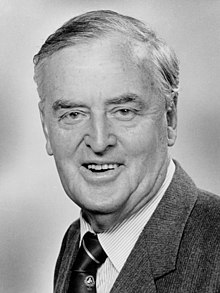The Honourable Sir Joh Bjelke-Petersen | |||||||||||||||||||||||||
|---|---|---|---|---|---|---|---|---|---|---|---|---|---|---|---|---|---|---|---|---|---|---|---|---|---|
 Official portrait, c. 1980 | |||||||||||||||||||||||||
| 31st Premier of Queensland Elections: 1969, 1972, 1974, 1977, 1980, 1983, 1986 | |||||||||||||||||||||||||
| In office 8 August 1968 – 1 December 1987 | |||||||||||||||||||||||||
| Monarch | Elizabeth II | ||||||||||||||||||||||||
| Governor | Alan Mansfield Colin Hannah James Ramsay Walter Campbell | ||||||||||||||||||||||||
| Deputy | Gordon Chalk William Knox Llew Edwards Bill Gunn | ||||||||||||||||||||||||
| Preceded by | Gordon Chalk | ||||||||||||||||||||||||
| Succeeded by | Mike Ahern | ||||||||||||||||||||||||
| 20th Deputy Premier of Queensland | |||||||||||||||||||||||||
| In office 1 August 1968 – 8 August 1968 | |||||||||||||||||||||||||
| Premier | Gordon Chalk | ||||||||||||||||||||||||
| Preceded by | Gordon Chalk | ||||||||||||||||||||||||
| Succeeded by | Gordon Chalk | ||||||||||||||||||||||||
| |||||||||||||||||||||||||
| |||||||||||||||||||||||||
| |||||||||||||||||||||||||
| Personal details | |||||||||||||||||||||||||
| Born | Johannes Bjelke-Petersen 13 January 1911 Dannevirke, New Zealand | ||||||||||||||||||||||||
| Died | 23 April 2005 (aged 94) Kingaroy, Queensland, Australia | ||||||||||||||||||||||||
| Resting place | Kingaroy, Queensland, Australia | ||||||||||||||||||||||||
| Citizenship | |||||||||||||||||||||||||
| Nationality | Australian | ||||||||||||||||||||||||
| Political party |
| ||||||||||||||||||||||||
| Spouse | |||||||||||||||||||||||||
| Children | 4 | ||||||||||||||||||||||||
| Relatives | Bjelke-Petersen family | ||||||||||||||||||||||||
| Education | Taabinga State School | ||||||||||||||||||||||||
| Occupation | |||||||||||||||||||||||||
| This article is part of a series on |
| Conservatism in Australia |
|---|
 |
Sir Johannes Bjelke-Petersen[b] KCMG (13 January 1911 – 23 April 2005) was an Australian politician. He was the longest-serving premier of Queensland, holding office from 1968 to 1987 as state leader of the National Party (earlier known as the Country Party).
Bjelke-Petersen was born in New Zealand's North Island to Danish immigrant parents. His family moved back to Australia when he was a child and settled on farming property near Kingaroy, Queensland. He left school at the age of 14 and went into farming. Bjelke-Petersen was elected to the Kingaroy Shire Council in 1946 and to the Queensland Legislative Assembly at the 1947 state election. He would serve in state parliament for over 40 years, holding the seats of Nanango (1947–1950) and Barambah (1950–1987).
Bjelke-Petersen was appointed as a government minister in 1963 and succeeded as premier and Country Party leader in 1968 following the death of Jack Pizzey. He would lead the party to seven consecutive election victories, governing in coalition with the Liberal Party until 1983. His first three electoral victories saw his party benefit from a system of rural malapportionment later nicknamed the "Bjelkemander", which allowed him to remain premier despite frequently receiving a smaller number of votes than the state's two other major parties.[2][3] The system earned Bjelke-Petersen the nickname "the Hillbilly Dictator". Regardless, he was a highly popular figure among conservative voters and over the course of his 19 years as premier he tripled the number of Country/National voters and doubled the party's percentage vote. After the Liberal Party pulled out of the Coalition government in 1983, Bjelke-Petersen reduced his former partners to a mere eight seats in an election held later that year. In 1985 Bjelke-Petersen launched a campaign to move into federal politics to become prime minister, though the campaign was eventually aborted.
Bjelke-Petersen earned himself a reputation as a "law and order" politician with his repeated use of police force against street demonstrators[3] and strongarm tactics with trade unions, leading to descriptions of Queensland under his leadership as a police state. Starting in 1987, this administration came under the scrutiny of a royal commission into police corruption and its links with state government ministers. Bjelke-Petersen was unable to recover from the series of damaging findings and after initially resisting a party vote that replaced him as leader, retired from politics on 1 December 1987. Two of his state ministers, as well as the police commissioner Bjelke-Petersen had appointed and later knighted, were jailed for corruption offences and in 1991 Bjelke-Petersen, too, was tried for perjury over his evidence to the royal commission; the jury failed to reach a verdict as the jury foreman was a member of the Young Nationals and a member of the "Friends of Joh" group, and Bjelke-Petersen was deemed too old to face a second trial.
During the Bjelke-Petersen era the state underwent considerable economic development.[4] He was one of the most well-known and controversial figures of 20th-century Australian politics because of his uncompromising conservatism (including his role in the downfall of the Whitlam federal government), political longevity, and the institutional corruption of his government.
Cite error: There are <ref group=lower-alpha> tags or {{efn}} templates on this page, but the references will not show without a {{reflist|group=lower-alpha}} template or {{notelist}} template (see the help page).
- ^ "A Country Road: The Nationals: Joh Bjelke-Petersen". YouTube. December 2014. Archived from the original on 12 December 2021. Retrieved 8 December 2018.
- ^ Lunn, Hugh (1987). Joh: The Life and Political Adventures of Sir Johannes Bjelke-Petersen (2nd ed.). Brisbane: University of Queensland Press. pp. 119–123. ISBN 0-7022-2087-6.
- ^ a b Peter Charlton, "Law and order the making of unlikely leader," The Courier-Mail, 25 April 2005, pg 25.
- ^ "Sir Joh, our home-grown banana republican" Archived 28 May 2008 at the Wayback Machine, The Age, 25 April 2005.